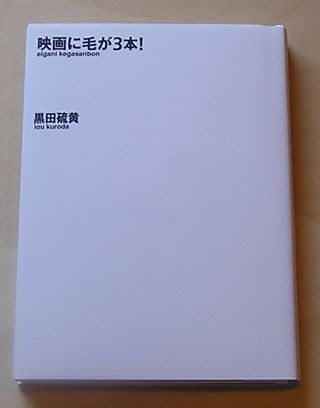
Eiga ni Ke ga Sanbon (映画に毛が3本!)
by Iou Kuroda (黒田硫黄)
published in Young Magazine Uppers (Kodansha)
1 volume (1998-2003)
Amazon.jp
A peculiarly unique oddity among Iou Kuroda's distinguished library. While Kuroda has tackled longer, serialized stories (Japan Tengu Party Illustrated), short story collections (Daioh, Kurofune), melting-pot concept pieces (Nasu) and episodic adventures (Sexy Voice and Robo), Eiga ni Ke ga Sanbon! (Three Hairs on a Movie) is possibly unique among all of manga: a collection of one-page manga movie reviews. (Let me parse that out: Each page is a self-contained manga that is a review of a movie.)
The series appears not to have been created as a primer for Kuroda's favorites, or significant movies, but simply, as with any typical published critic, reviews of the latest movies to be shown in theaters. Therefore the Japanese release dates for these selections start in 1998 and proceed at about a month at a time until 2003, when the book was published. The movies encompass a wide range of sources, from Hollywood blockbusters (Saving Private Ryan, Deep Impact, American Pie) and more sophisticated fare (Eyes Wide Shut, Magnolia, Road to Perdition) to European (Dancer in the Dark, Life Is Beautiful, Bandits) to Asian (Shaolin Soccer, Shuri, Flowers of Shanghai) and of course, Japanese (Ping Pong, Battle Royale, Spirited Away, Samurai Fiction). The formatting is set up so that one page has the title and main credits, a short blurb, then a quick description of the movie and written comment by Kuroda, including a "moral learned," with the manga itself on the facing page.
I've found that Kuroda's voice within his dialogue requires an acclimation period. I wasn't able to fully follow his nuanced, fill-in-the-blanks flow the very first time I read Nasu, and the novel format he uses in Eiga has several more hurdles to overcome. First of all, there's only so much you can get out of them if you haven't seen the movie, and being a poor excuse for a movie buff, I've only seen a handful of the 60-something reviews in the book. Second, with just a single page to craft a review, Kuroda naturally channels his thoughts as succinctly and vividly as possible, so if you don't really get what his point is, there's no time to let it sink in. Either you see where he's coming from, or you don't. Occasionally he will make a point that is funny or memorable that can be appreciated apart from the movie itself, but for the most part a lot of the reviews blew past me without sticking in my head. Of course, being Kuroda, he wastes little time on formalities and gets straight to the point, so many of these read like thoughts and impressions told directly in person, with a fresh frankness that is befitting the odd medium and quite unlike a stuffy newspaper review. It makes for good bathroom reading, at the very least.
Kuroda stopped his reviews for a few years but has apparently picked them back lately, according to his blog, so one only assumes there will be another "Eiga" book sometime in the distant future.
5 comments:
This sounds... original, really. I'd love to get it one moment or another, but is it actually worth it? I am interested though, don't get me wrong on that.
i totally wanna check that Dancer in the Dark review...
actually, being suach a sucker for Kuroda works, iwanna check it all ;]
It's really kind of a "Kuroda fans only" book. I mean, I love the man, but after tracking down all his "regular" books in print, it was only a few months ago that I decided, "maybe I should finally grab that movie review book..."
It's funny to see him draw some of the characters/actors from the movie. That's at least something you can recognize without needing any language skills.
His Dancer in the Dark review is good. He describes going to see the movie like walking into a sushi shop and asking for "swordfish" only to have the chef plunge a giant live swordfish nose-first into your chest. It's not really what you expected to get (though you did ask for it) and you have no choice but to spend the rest of the day with a great weight in your chest until you come to terms with it.
Yeah, despite what seems to be a pretty lukewarm review, I still wish I could look through it too.
I thought his critique of Ping Pong was pretty dead-on as well (all the good parts can be attributed to the original manga, all the bad parts to Yosuke Kubozuka).
Post a Comment